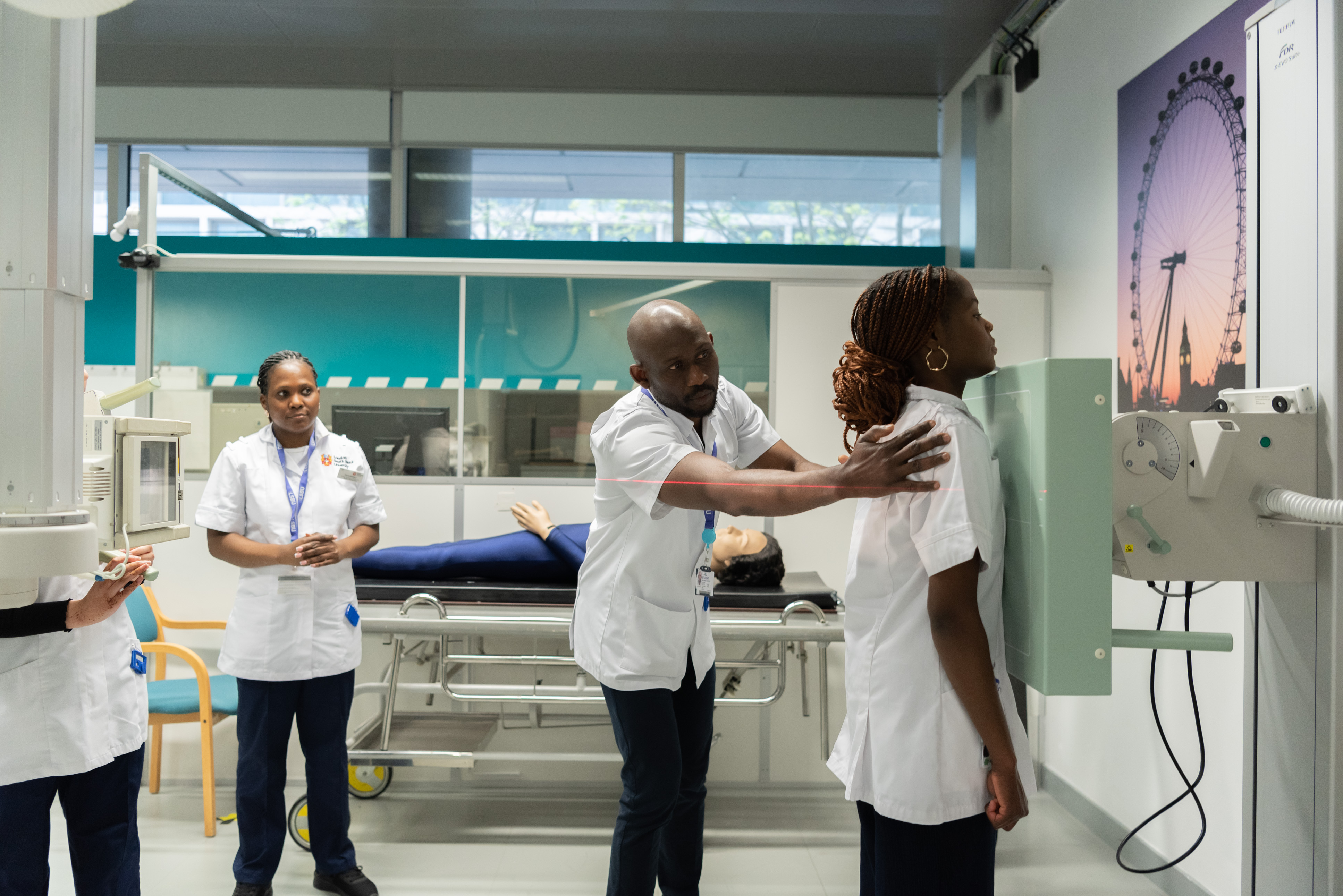Only Social Work applicants need to pay for their DBS. It costs £46 and can be purchased on our online store.
Search our site...
Search module
Overview
Due a high number of applications, this course is now closed to new applications for September 2024. You might instead be interested in Therapeutic Radiography, Operating Department Practice or our Nursing & Midwifery courses.
Radiography is a critical tool at the technological forefront of the fast-changing healthcare environment. Its importance makes it a dynamic and developing profession that’s highly in demand, and this course will set you up for a successful career as a Diagnostic Radiographer. You’ll combine academic study with clinical practice in London’s renowned teaching hospitals to graduate with all the skills you need to produce the highest quality images while providing patients with excellent care. You’ll then be able to apply for registration with the Health and Care Professions Council (HCPC) as a Diagnostic Radiographer, enabling you to take your first post in your exciting career.
This course provides an all-encompassing experience that enables you to put theory into practice. We have an excellent working relationship with our numerous clinical training sites who offer an excellent overall student experience and contribute to the development of well-rounded newly qualified Diagnostic Radiographers, ready to take on the exciting challenge of the first post after graduation.
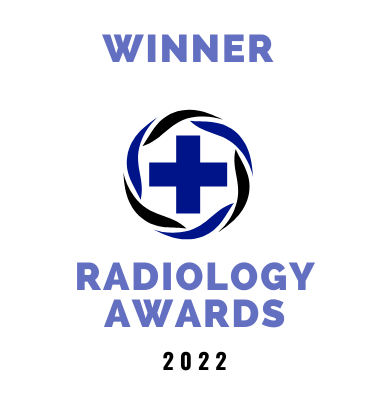
The programme is awarded the Diagnostic Radiography Course of the Year 2022, Radiology Awards 2022
Diagnostic Radiography (Rachel Picton) from School of Health and Social Care on Vimeo.
Why Diagnostic Radiography at LSBU?
- poll
- Winner of Diagnostic Radiographer Course of the Year 2022 - Radiology Awards
- check-circle
- Approved by the Health and Care Professions Council and accredited by the Society and College of Radiographers.
- medkit
- On completion, you can apply for registration with the Health and Care Professions Council as a diagnostic radiographer.
- heartbeat
- Gain clinical experience in many of London's internationally renowned teaching hospitals.
- clinic-medical
- Access to the Digital Diagnostic X-ray Room and the Digital Interpretation Lab.
- rocket
- LSBU Health and Social Care graduates are the second highest paid among all London Modern university graduates, and the sixth highest in the UK one year after graduating (DfE LEO data 2022).
- user-md
- Students on this course could be eligible to receive a non-repayable amount of up to £11,000 per academic year with the NHS Learning Support Fund.
Location
London South Bank University student union is located at 103 Borough Rd, London SE1 0AA.
If you are visiting our Southwark Campus, you may wish to use our downloadable campus map (PNG File 466 KB). For information on accessibility, see our DisabledGo access guides. See our location page for more details.
Entry Level Requirements
Entry to the Diagnostic Radiography course will be based on your personal statement and academic results. Academic results must include the following:
- A Level BBB including Science or;
- BTEC National Diploma DDD in Science or professionally relevant subject or;
- Access to HE Diploma in Science or similar with 30 Distinctions of which 18 must be in Science or;
- Equivalent level 3 qualifications also considered
- 5 GCSEs A-C including Maths, English and Science or equivalent (reformed GCSEs grade 4 or above).
Additional entry requirements
- All Applicants must be 18 years or over at the commencement of the course
- Provide satisfactory references
- Occupational health clearance
- Enhanced Disclosure Barring Service (DBS)
- Proof of ordinary residency
- A valid passport required for enrolment purposes
- Personal qualities and values in line with those expected by the NHS constitution
Personal Statement
It is important to focus on your personal statement to let us know why you are the right candidate to study Diagnostic Radiography at LSBU. Try to include answers to the five questions below within your statement and ensure it is personal to you:
1. Why Diagnostic Radiography?
What traits and characteristics do you have that will make you a great radiographer? What are your goals for this career?
2. What is your understanding of the role of a Diagnostic Radiographer?
What is the scope of practice and what skills are required? Include examples to show you have these skills.
3. Why do you want to study at London South Bank University?
4. Do you have any experience in a health care environment or imaging department?
Explain what you have gained from this experience and why you think you are suited to the role. This experience could be for a day or a week. Experience in a radiography department or a healthcare environment is a great way to see firsthand what a radiographer does on a day-to-day basis. This is not a requirement for the course however it is seen as beneficial.
5. Do you have any hobbies, interests, work or volunteer experience that can be applied to working as a Diagnostic Radiographer?
Explain what it is and how it will help to prepare you for a career as a Diagnostic Radiographer.
English language
Those whom English is not their first language must achieve a minimum score of 7.0 overall or equivalent with not less than 7.0 in the listening and reading sections and not less than 7.0 in the writing and speaking sections for the International English Language Test Score (IELTS) at the time of application.
Advanced entry
If you have already completed some studies at another university, we may be able to consider you for advanced entry. Please see our advanced entry page for more information.
Foundation Year
If you have been out of study for a considerable amount of time or have slightly missed the entry requirements this course, you can take your first steps to becoming a registered practitioner with our Health and Social Care Foundation year. Boost your qualifications and confidence for further study with this one-year introductory course and on completion of this course you will be guaranteed entry on to one of our 13 health BSc pre-registration health and social care degrees.
Choose your country
Select country here:
Missing English and Maths qualifications?
If you do not have the required English and Maths qualifications needed to satisfy the entry requirements for this programme, we have courses available at our partner College that you can take to upskill in these areas. Find out more at South Bank College.
Advanced entry
If you have already completed some studies at another university, we may be able to consider you for advanced entry. Please see our advanced entry page for more information.
For more information, including how and when to pay, see our fees and funding section for undergraduate students.
Please check your fee status and whether you are considered a Home, EU or International student for fee-paying purposes and for our regulatory returns, by reading the UKCISA regulations.
See our Tuition Fees Regulations (PDF File 391 KB) and Refund Policy (PDF File 775 KB).
Possible fee changes
The University reserves the right to increase its fees in line with changes to legislation, regulation and any government guidance or decisions.
The fees for international students are reviewed annually and the University reserves the right to increase the tuition fees in line with the RPIX measure of inflation up to 4 per cent.
Scholarships
We offer several types of fee reduction through our scholarships and bursaries. Find the full list and other useful information on our scholarships page.
All full-time undergraduate students apply to the Universities and Colleges Admissions Service (UCAS). Full details of how to do this are supplied on our How to apply webpage for undergraduate students.
Personal Statement
It is important you focus on your personal statement to let us know why you are the right candidate for Diagnostic Radiography at LSBU. Try to include answers to the five questions below within your statement and ensure it is personal to you:
1. Why Diagnostic Radiography?
What traits and characteristics do you have that will make you a great radiographer? What are your goals for this career?
2. What is your understanding of the role of a Diagnostic Radiographer?
What is the scope of practice and what skills are required? Include examples to show you have these skills.
3. Why do you want to study at London South Bank University?
4. Do you have any experience in a health care environment or imaging department?
Explain what you have gained from this experience and why you think you are suited to the role. This experience could be for a day or a week. Experience in a radiography department or a healthcare environment is a great way to see firsthand what a radiographer does on a day-to-day basis. This is not a requirement for the course however it is seen as beneficial.
5. Do you have any hobbies, interests, work or volunteer experience that can be applied to working as a Diagnostic Radiographer?
Explain what it is and how it will help to prepare you for a career as a Diagnostic Radiographer.
International applicants
The application process may involve further steps for International applicants (non-EU nationals). All non-EU applicants for this course must therefore contact the International Office as soon as possible to discuss the admissions steps and the immigration requirements : international@lsbu.ac.uk or +44 (0) 20 7815 6189.
Personal statement
See our top tips for writing your personal statement.
Prepare to start
Disclosure Barring Service (DBS)
All pre-registration students need to be DBS cleared before going on placement. You’ll need to have an enhanced DBS check even if you have had one before and will not be able to go on placement until this is complete.
The DBS process is not difficult but can take some time so it's best to get started as soon as you receive your email. You will receive the email during Summer 2023.
DBS update service
If you're part of the DBS update service, your subscription is up to date and you already have a DBS certificate, please bring in your original green DBS certificate for the document check. To take advantage of the update service, your certificate needs to be classified as 'Enhanced' and workforce must be listed as 'Adult and Child'. If you have any queries, please email us at hscdbsoh@lsbu.ac.uk.
How to complete your DBS
Our DBS supplier, Verifile, will send you an email with all the details you need to complete your DBS.
Verifile will give you instructions to log into their system and complete your personal details and information. To complete the process, you'll need your passport or driving licence and 5-year address history including dates when you moved in/out.
You can use your application number to track the progress of your DBS.
When you've finished, your Disclosure Statement will be mailed to the most recent address in your submission, so please make sure it's correct. We don't automatically receive a copy of this Statement, which is why we need you to bring it in as part of the next step.
Frequently asked questions
What do I need to declare on my DBS?
Please include any and all major and minor, spent and unspent convictions, cautions, warning and reprimands, even if they relate to juvenile offences or seem trivial or unimportant. Some minor offences will not prevent you from going on placement or being offered a place on your course, but still need to be reviewed so it’s best to be honest and include everything. Also, the more information you include about any offences can help reduce the time it takes to assess them.
I’ve applied for/had a DBS in past. Do I need to do it again?
Yes, you do. You need to have an up-to-date DBS. Once you have received the email from our DBS supplier make sure you start the process straight away. All details of how to do this will be outlined in the email. If you don’t complete your DBS in the timeframe given, we may withdraw your offer even if term has already started. So it’s important that you get started as soon as you receive the email.
Why do I need an enhanced DBS check?
Government legislation requires all Higher Education Institutions who offer courses where students may come into unsupervised contact with children or vulnerable adults to have this check. These checks also help us to ensure duty of care to our students, and create a safer environment for patients seen by our students.
Who reviews my DBS?
As part of the University’s admissions process, declarations of any offence may be referred to a virtual panel made up of senior managers from partner NHS Trusts and/or other sectors within Health and Social Care. Any DBS that is considered by the panel will be anonymised. The panel members then deliberate and make a recommendation whether the application be rejected, accepted or request further information or documents.
When will I hear back from the panel about my DBS?
If you have declared an offence, we might ask for more information from you in writing which will help the panel make a decision. Once your declaration has been referred to the panel it can take up to 28 working days to be processed.
Which address do I use?
You need to put your current address on your DBS application because this is where your Statement will be mailed. If you’ve moved house between submitting and receiving your DBS, make sure you have mail forwarding set up so that you’ll receive your statement. If you’ve moved recently, make sure you have proof of your new address (such as a new bank statement) to bring for your document checks.
I’ve lost my statement. What do I do?
If you’ve lost your statement you will need to pay £46 to purchase a new one.
I’ve had my application rejected due to my DBS declaration/disclosure. Can I appeal the decision?
Yes. If your application has been rejected due to your DSB declaration/discloser, you will be sent a letter to confirm this. There will be instructions in the letter about how you can appeal and which supporting information you need to provide. Once a decision has been made you will receive a letter from the School Executive Team.
Document check
Once you have completed the online part of the DBS process, you will need to produce three accepted documents from this list (PDF File 248 KB) to be verified.
Document check on campus
Southwark: Southwark Student Help Desk in the K2 building Monday – Friday between 9am-11am or 1pm-4pm
Havering: come to reception at Havering Monday – Friday between 8:30-10:30am, 12-2pm, 4-5pm
Document check at the Post Office
If you’re not able to come to campus, you can get your documents checked and certified at the Post Office for a fee of £10.50. To do this, make photocopies of your three accepted ID documents and take your DBS form, copies and originals of your documents to the Post Office. The Post Office will stamp the form and photocopies and given them back to you. Email your post office receipt, stamped form and stamped documents to hscdbsoh@lsbu.ac.uk.
Occupational Health (OH)
An exciting part of many of our Health and Social Care courses is the opportunity to learn off-campus and work with patients, clients and/or service users. Before you start, we need to make sure that you have the correct levels of immunisations.
Questionnaire
GP appointment
The second part of your occupational health check is to get any inoculations that you may need from your GP. When attending your GP appointment, please take printed copies of these two documents with you.
Vaccination Screening Advisory Letter (PDF File 126 KB)
GP Vaccination and Screening History (PDF File 117 KB)
Occupational Health appointment
After these steps are complete you will receive an email from OHWorks Ltd inviting you to attend an appointment on-campus with an Occupational Health Nurse. These appointments take place during the week and sometimes when your classes have already started.
The OH team have prepared this guide (PDF File 588 KB) which outlines what to expect at each stage. If you have queries or concerns about your Occupational Health clearance or inoculations please contact the Occupational Health team.
Frequently asked questions
Do I need to be double vaccinated?
Yes - government legislation advises that everyone must be double vaccinated to work in a health care setting with effect from 1 April 2022.
My local GP doesn’t have my vaccination history. What should I do?
Contact the OH team at lsbu@ohworks.co.uk who will be able to advise you.
What if I can’t make my OH appointment?
Please contact the OH team to reschedule at least 48 hours in advance. Remember that you won’t be able to go on placement until you’re cleared.
I’ve already registered with LSBU’s Disability and Dyslexia Support Unit (DDS). Do I still need to tell the OH Nurse about my condition?
Yes. Tell the OH Nurse about all conditions including specific learning difficulties even if you’ve declared these in the past. This will allow us to make reasonable adjustments whilst you’re on placement.
If I’ve declared a condition to the OH Nurse, do I need to register with LSBU’s Disability and Dyslexia Support Unit as well?
The information you share with the OH Nurse will be treated with confidence, meaning that it won’t be automatically shared with the DDS team. The DDS team can help you to receive support for your lectures, assignments and exams so it’s worth to register with them and provide evidence of your condition if you need this support.
Numeracy practice
Before starting your course, you may want to check or practice your numeracy skills. The National Numeracy Challenge is a free online tool that helps you learn, revise and quiz your essential numeracy skills. You’ll also be able to get a certificate to show your efforts.
Enrolment and Welcome Week
Before you start your course we’ll send you information on what you’ll need to do before you arrive and during your first few days on campus. You can read about the process on our new students pages.
Uniforms
Most placements and some practical sessions in our skills laboratories will require you to wear a uniform and name badge. You will be measured for uniforms specific to your course as part of your Welcome Week activities after enrolment. In the meantime, we have prepared answers to frequently asked questions that you might find useful.
Frequently asked questions
Do I get a uniform for when I go on placement?
Yes, LSBU will supply you with uniforms for your placement with the exception of Social Work and Health and Social Care BSc students who are not required to wear uniforms for their placements.
Which uniforms will I receive?
Nursing and midwifery students will receive two pairs of trousers, three tunics and a name badge. Polo shirts will be issued instead of tunics for students studying mental health nursing, physiotherapy, chiropractic and sport rehabilitation. ODP students will receive one set of scrubs top and trousers.
How long do the uniforms need to last?
The items are to last for the duration of your programme of study.
How do I know what size I am?
A measuring and distribution service will be available by the uniform provider at both Southwark and Havering campuses. As garments are fitted for work purposes they need to allow for flexibility of movement so it’s best to have the uniform provider measure you up.
Am I able to request a longer tunic?
You can request a longer tunic for religious or medical reasons. To do this, you should advise the uniform supplier at the measuring session. These tunics are 2 inches longer and sleeves finish just above the elbows. Due to infection control, full length sleeves are not permitted.
Can I use a preferred name or a nickname on my name badge?
Name badges are professional and need to include your formal names.
What do I do if I lose or damage my name badge?
You can order a replacement name badge direct with the uniform provider. Badges need to be worn at all times when you are at placement.
Can I order more uniforms?
You are welcome to purchase additional items at Work in Style. You will need to log in using your student ID and then follow the step-by-step instruction. Please note that dresses are not available.
Can I try on my uniforms?
You should try on your uniforms the day you receive them so that the staff at the measuring service can help arrange any size exchanges. If you choose not to try on your uniforms and require different sizes at a later date you will need to purchase these through the uniform provider’s online portal at your own cost.
What do I do with my uniform after I complete my studies?
They are yours to keep – you do not need to return the garments.
Practice placements
Most health and social care courses’ practice placements will operate outside normal working hours e.g. evenings, nights, weekends and bank holidays.
Holidays
Your holiday periods will not follow the normal University timetable because of placements. You’ll receive more details once you start your course.
You'll be trained to produce the highest quality image, whilst providing a high standard of care for your patients. This course covers patient management, anatomy, physiology and pathology, radiation physics and radiographic techniques.
Methods of assessment for course overall: 30% coursework.
Some compulsory skills sessions may take place in the evening.
- Introduction to Radiation Science
This is a foundation module aimed at students who'll be working with ionising radiation in a clinical environment. The module will introduce the basic concept of atomic structure and will then build on this to explain how x-rays are produced and how radiation interacts with matter. Fundamentally, this module will concentrate on using radiation in a safe manner and will therefore include sessions on radiobiology (including genetics), radiation protection (including personal dosimetry and QA) and the legislation surrounding the use of ionising radiation in the clinical environment. Level 4. 20 Credits. Formative assessment: Mock examination. Summative assessment: 2-hour unseen written examination. 40% pass mark. 100% weighting. - Systemic Anatomy and Physiology 1
The module is designed to provide knowledge of the anatomy and physiology of the following key body systems: integumentary, respiratory, gastrointestinal, cardiovascular, and urinary. Some aspects of the physiology and pathology of the musculoskeletal system will also be addressed. Level 4. 20 Credits. Formative assessment: Mock examination. Summative assessment: 2 hour unseen written examination. 40% pass mark. 100% weighting - Principles of Clinical Reasoning in Medical Imaging
This module offers a foundation for students undertaking the diagnostic imaging pathway. It provides a context for the practice of diagnostic imaging and a basic insight into the radiological environment and associated general principles. In addition, the module introduces the skills of clinical reasoning and reflection, evaluating information to facilitate evidence-based practice, and problem-solving within the context of the clinical environment. Level 4. 20 Credits. Formative assessment: 500 word draft or plan of summative assignment. Summative assessment: 3000 word written assignment OR, 20 minute podcast. 40% pass mark. 100% weighting. - Concepts of Interprofessional and Collaborative Practice
This module will introduce you to the place and value of inter-professional and collaborative working in health and social care delivery. The module aims to support the development of the necessary communication, personal, partnership working and reflective practice skills required to meet the needs of clients/carers and diverse populations who are at the centre of inter-professional health and social care delivery. You'll work collaboratively online to explore and develop an understanding of the purpose, scope and range of inter-professional and collaborative working. Assessment method: 100% coursework. 20 credits. - Medical Imaging Practice 1
This module acts as a basis for the development of requisite skills and competence in the practice of routine, conventional diagnostic imaging. It's clinically based and requires that you have access to an agreed and formally accredited practice placement site. Level 4. 40 Credits. Formative assessment: Mock examinations and continuous clinical monitoring via clinical portfolio. Summative assessment: Semester 1 a 2 hour unseen written examination 50% weighting, Semester 2 a 1 hour unseen workstation examination 50% weighting, and Clinical Portfolio Pass/Fail. Students are required to achieve a pass in all elements of assessment. - Medical Imaging Modalities
This is module aimed to develop students understanding of specialist imaging modalities and their application in a clinical environment. The module will introduce the basic concept of image production of IR, CT, MRI, ultrasound and nuclear medicine. Level 5. 20 Credits. Formative assessment: Group presentation. Summative assessment: Poster presentation examination. 40% pass mark. 100% weighting. - Systemic Anatomy and Physiology 2
The module is designed to provide knowledge of the anatomy and physiology of the following key body systems: reproductive, vascular and hepatobiliary. Level 5. 20 Credits. Formative assessment: Mock examination. Summative assessment: 2 hour unseen written examination. 40% pass mark. 100% weighting. - Medical Imaging of Pathology and Disease Processes
This module aimto provide students with knowledge of common disease processes in selected body systems and recognise the impact these diseases have on other systems. Level 5. 20 Credits. Formative assessment: 500 word draft or plan of summative assignment. Summative assessment: 3000 word written assignment OR, 20 minute podcast. 40% pass mark. 100% weighting - Appraising Evidence for Research Informed Practice
This module aims to develop students’ appreciation for the role of research and evaluation in contemporary healthcare practice. This is done by enabling students understanding of the research process by teaching them how to read, interpret and appraise primary research that is relevant to practice. Level 5. 20 Credits. Formative assessment: 500 word draft or plan of summative assignment. Summative assessment: 3000 word written assignment. 40% pass mark. 100% weighting. - Medical Imaging Practice 2
This module continues to develop student’s clinical skills and competence in the practice of routine, conventional diagnostic imaging and introduces specialist modalities such as CT, ultrasound and nuclear medicine. Level 5. 40 Credits. Formative assessment: Mock examinations and continuous clinical monitoring via clinical portfolio. Summative assessment: Semester 1 a 2 hour unseen written examination 50% weighting, Semester 2 a 1 hour unseen workstation examination 50% weighting, and Clinical Portfolio Pass/Fail. Students are required to achieve a pass in all elements of assessment. - Professional Identity, Autonomy and Accountability
This module has a focus on accountability, professional behaviours and continual professional development. Level 6. 20 Credits. Formative assessment: 500 word draft or plan of summative assignment. Summative assessment: 3000 word written assignment OR, 20 minute podcast. 40 % pass. 100% weighting - Interpretation of Medical Imaging
This module offers the student an opportunity to interpret radiographic images. This module will provide the student with the advanced clinical perspective necessary for them to make an effective and safe contribution in their first clinical appointment. Level 6. 20 Credits. Formative assessment: Mock written exam. Summative assessment: 2-hour unseen work station written examination. 40% Pass mark. 100% Weighting. - Contemporary Issues in Medical Imaging
The main focus of the module will be an understanding of the application of evidence-based practice within diagnostic imaging. It seeks to address emerging topics which are of importance to imaging practitioners, service users and health care providers. It is essential that this module maintains a contemporary focus throughout and therefore the indicative content, within a broad structure, will be governed to some extent by changes in health care policy and areas of student interest. Level 6. 20 Credits. Formative assessment: 500 word draft of the summative assignment. Summative assessment: 3000 literature review. 40% pass mark. 100% weighting - Improving quality, change management and leadership
This module is the final interprofessional learning module that will explore leadership, quality improvement and change within organisations from an interprofessional perspective. The module looks at a strategic, evidence based approach to change management in a range of environments. Level 6. 20 Credits. Formative assessment: 500 word draft or plan of summative assignment. Summative assessment: 3000 word written assignment OR, 20 minute podcast 100% weighting - Medical Imaging Practice 3
This module continues to develop student’s clinical skills and competence in the practice of routine, conventional diagnostic imaging and introduces specialist imaging such as MRI, neuroradiology, cardiac and breast imaging. Level 6. 40 Credits. Formative assessment: Mock examinations and continuous clinical monitoring via clinical portfolio. Summative assessment: Semester 1 a 2 hour unseen written examination 50% weighting, Semester 2 a 1 hour unseen workstation examination 50% weighting, and Clinical Portfolio Pass/Fail. Students are required to achieve a pass in all elements of assessment.
Year 1
Year 2
Year 3
Facilities
Digital Diagnostic X-ray Room
LSBU recently launched the innovative Fujifilm D-EVO suite for Diagnostic Radiography students. This is a digital diagnostic X-ray room, which is used as a general X-ray room for practical tutorials on radiographic technique. Students are able to practice on each other and use the equipment , such as moving and positioning X-ray tube, table and vertical stand. This helps them to learn patient positioning for general radiographic positioning.
Digital Interpretation Laboratory
Diagnostic Radiography students use the digital image interpretation lab with a Picture Archiving and Communication System (PACS) similar to that used in the NHS. In this lab there is:
- 25 PCs with dual roles
- image interpretation - connected to the PACS
The image interpretation lab is used for positioning workshops where limbs are positioned into appropriate points for X-ray. Students evaluate images and diagnose fractures and breaks as well as carrying out mandatory training of moving and handling the patient. In workshops, students are presented with a case study and have to decide how to best achieve desired images.
Students use the laboratory on a weekly basis throughout their studies and case studies of images get progressively more difficult throughout the course.
Careers
Employability Service
At LSBU, we want to set you up for a successful career. During your studies – and for two years after you graduate – you’ll have access to our Employability Service, which includes:
- An online board where you can see a wide range of placements: part-time, full-time or voluntary.
- Our Careers Gym offering group workshops on CVs, interview techniques and finding work experience, as well as regular presentations from employers across a range of sectors.
Our Student Enterprise team can also help you start your own business and develop valuable entrepreneurial skills.
Graduates from this course are eligible to apply for registration as a diagnostic radiographer with the Health and Care Professions Council (HCPC), allowing them to practice within the NHS as well as the private sector both in the UK and abroad.
Role and responsibilities
Diagnostic radiographers use sophisticated equipment to produce high-quality images of the human body in order to identify and diagnose injury and disease. From X-rays and CT scanners through to using radio nuclide imaging, there are a wide range of imaging technologies available for diagnostic radiographers to use.
Diagnostic radiographers need to be able to use highly technical, computerised equipment, and require strong levels of attention to detail and good interpersonal skills.
There are options available for specialisation, such as trauma/accident and emergency, or medical ultrasound. This can be one route for career development, however there are opportunities to advance into senior practitioner roles, or into management regardless.
Salary
Most diagnostic radiographers work for the NHS, where the starting salary is around £20,000 - £27,000. Depending on career progression, you could earn up to £65,000. (All About Careers)
Career progression
Recent graduates from this course have gone onto roles in a range of specialist areas and have opportunities to progress in a variety of health-related fields. Some of our graduates go on to attain consultant practitioner status or to diversify into fields such as research, education or management.
If you graduate from this course and become a clinically experienced diagnostic radiographer, you can gain additional expertise through postgraduate, post-registration and continuing professional development frameworks. Have a look at professional development courses in our online CPPD prospectus.
The programme is accredited by the Society and College of Radiographers and successful completion confers eligibility to apply for registration with the Health and Care Professions Council (HCPC).
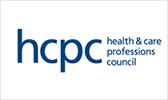
The Health and Care Professions Council is the regulator of health, Psychological and Social professionals
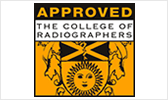
The Society and College of Radiographers is the professional body representing the radiography workforce

The programme is awarded the Diagnostic Radiography Course of the Year 2022, Radiology Awards 2022
Placements
You'll spend 50% of your time involved in academic study and 50% in clinical practice within a broad variety of health care settings. A clinical practice placement allows you to put theory into practice by working with a range of health professionals in clinics. Although sometimes initially challenging, practice learning is one of the most interesting and exciting aspects of learning to be a radiographer.
Clinical settings
You'll experience a variety of placements, in NHS acute Trusts, community placements, and the independent sector.
Our main clinical sites for placements include:
- Guy's and St Thomas' NHS Foundation Trust
- King's College Hospital
- St George's Hospital
- Queens Hospital, Romford
- Barts Health
- Queen Elizabeth Hospital, Woolwich
- Darent Valley Hospital, Dartford,
- Princess Royal University Hospital, Farnborough
- University Hospital, Lewisham
- Royal Sussex University Hospital, Brighton
- East Surrey Hospital, Redhill
- Hammersmith and Charing Cross Hospitals
- Epsom General Hospital
- The Lister Hospital, Chelsea Bridge
- The London Bridge Hospital
Specialist placements include those at:
- Guy's and St Thomas' NHS Foundation Trust
- King's College Hospital
- The National Hospital for Neurology and Neurosurgery, Queen Square
- St George's Hospital
- Great Ormond Street Hospital
Structure of placements
Placements are spread over the three years:
Year 1
These first placements take place in general X-ray, emergency X-ray, and fluoroscopy.
You will start the course in September and will attend your first placement in semester 1; this introduces you to theory in practice from the very start of your course. Many of the staff you will be working with are themselves alumni, so have a sound understanding of what you will need for your placement.
Year 2
Second year placements will include IR, CT, MRI, US and nuclear medicine.
Year 3
When on placement, you will act as a supernumerary member of staff whilst working closely with your supervising radiographer at all times. You will also gain specialist placement experience in breast, cardiac and neuro imaging.
At two of our sites we have Lecturer Practitioners; staff who work closely with you whilst on placement. Our other sites have a Link Tutor allocated - a University Tutor who provides support to you. These sites also have nominated Practice Educators who'll look after you during your placement.
Support from a mentor
At two of our sites we have Lecture Practitioners; staff who work closely with you whilst on placement. Our other sites have a Link Tutor allocated - a University Tutor who provides support to you. These sites also have nominated Practice Educators who'll look after you during your placement.
Teaching and Assessment
A varied teaching and learning diet is used to allow students to learn in a variety of ways and build competence.
Resources
| Lectures and seminars | Self-directed study | Work-based placements | |
|---|---|---|---|
| Year 1 | 16% | 42% | 42% |
| Year 2 | 16% | 44% | 40% |
| Year 3 | 17% | 47% | 36% |
Personal tutoring
As a Health and Social Care student, you will be allocated a named tutor during your first three weeks at LSBU. The role of your tutor is to be your primary contact for academic and professional development support.
Your tutor will support you to get the most of your time at LSBU, providing advice and signposting to other sources of support in the University. They should be the first person at the university that you speak to if you are having any difficulties that are affecting your work. These could be academic, financial, health-related or another type of problem.
Teaching Team
Staff who teach on the course come from the Division of Radiography and ODP and more specifically are trained and experienced Diagnostic Radiographers, with input from other Divisions in the Institute of Health and Social Care. Service users and people with lived experience also contribute to delivery of the course.
People profiles
-
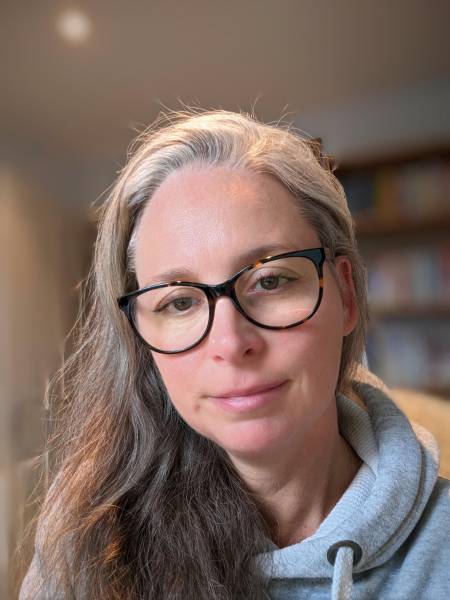
Miss Claire Carter
Allied and Community Health -
.jpg)
Mr Stavros Daoukas
Allied and Community Health -

Miss Gail Edwards
Allied and Community Health -

Miss Djamila Hamdaoui
Allied and Community Health -
.jpg)
Miss Caitlin McLarty
Allied and Community Health -
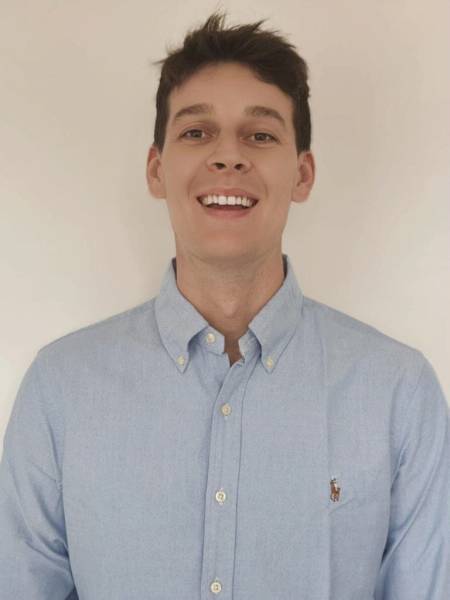
Mr John O'Neill
Allied and Community Health -
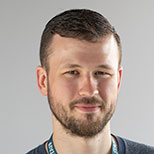
Mr Michael Williams
Allied and Community Health
